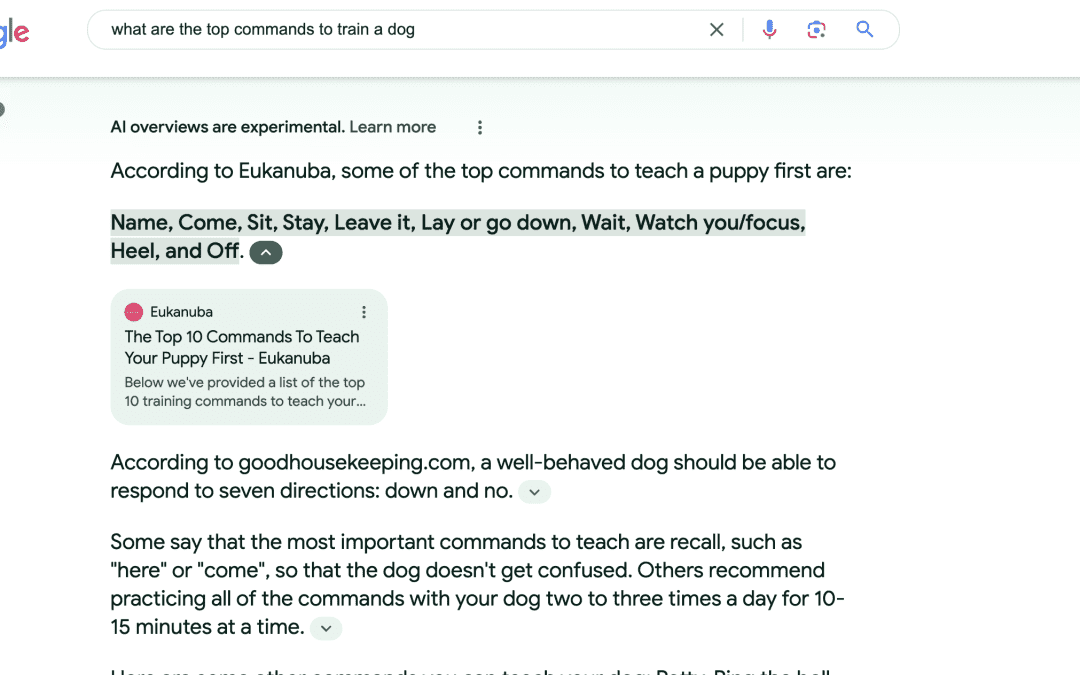Google’s Search Generative Experience often plays the understated counterpart to its more visible innovations, yet it establishes its domain with unmatched precision and user-centric design. This distinctive approach sets it apart in the expansive universe of search technologies, offering a unique journey that positions Google’s Generative Search as a leader in its field. Key enhancements brought forth by the March 2024 Core Algorithm Update include refined natural language processing, improved search intent recognition, and a more intuitive user interface, each known for their significant impact on search efficiency and accuracy.
Table of Contents
- What is Google’s Search Generative Experience?
- How did the March 2024 Core Algorithm Update change Google’s search?
- What are the impacts of the update on search results?
- How can users optimize their search experience post-update?
- What strategies should content creators adopt to align with the update?
- What are the potential future developments in Google’s search technology?
The Search Generative Experience also shines through its ability to deliver personalized and contextually relevant results, offering a nuanced but comprehensive choice for users. Delving deeper, each innovation within the Search Generative Experience introduces its own array of features, advancements in AI, historical context, and implications for both users and content creators. The subsequent sections will delve into these elements in depth, providing a more thorough comprehension of how Google’s Search Generative Experience has redefined the landscape of digital search, making it an invaluable tool for navigating the vast information landscape of the internet.
What is Google’s Search Generative Experience?
Google’s Search Generative Experience, or SGE, is a cutting-edge advancement in search technology, leveraging advanced algorithms and machine learning to interpret and respond to queries with a level of understanding akin to human conversation. This sophisticated approach enhances the search engine’s ability to grasp the context and intent behind searches, leading to outcomes that are not just accurate but also highly pertinent to the user’s specific inquiries. At the core of this transformative experience is the integration of enhanced natural language processing capabilities, allowing Google to dissect the subtleties of search queries more effectively than ever before.
This ensures that the information presented to users is precise and customized to meet their needs. By setting a new benchmark for digital search efficiency and intuitiveness, Google’s Search Generative Experience signifies a pivotal move toward a future where information retrieval is seamlessly aligned with the natural complexities of human inquiry and interaction.
How did the March 2024 Core Algorithm Update change Google’s search?
The March 2024 Core Algorithm Update marked a transformative period for Google’s search, introducing enhanced natural language processing (NLP) that significantly refined the search engine’s comprehension of user queries. This technological leap has allowed for a deeper understanding of search intent, ensuring that user results are more closely aligned with their actual needs. The update has fostered a more intuitive user experience characterized by faster and more relevant search outcomes.
This update has redefined the interaction between users and Google’s search platform by prioritizing the reduction of misinformation and raising the bar for content quality. Furthermore, it has shifted the landscape for content creators, emphasizing the importance of SEO adjustments to meet new standards. This evolution underscores a broader movement towards a search ecosystem that values depth, relevance, and the integrity of information above all.
Enhanced Natural Language Processing
At the heart of the March 2024 Core Algorithm Update is its enhanced natural language processing (NLP) capabilities. This advancement significantly boosts Google’s proficiency in deciphering the complexities of human language. It allows for a more sophisticated understanding of queries, ensuring the search engine comprehends the context and subtleties of user inquiries with an unprecedented level of precision.
This development in NLP technology is a crucial step towards offering a search experience that is not only more natural and intuitive but also mirrors human conversation and comprehension more closely.
More Accurate Search Intent Recognition
In tandem with improvements in NLP, the update has also fine-tuned Google’s ability for more accurate search intent recognition. This refinement enhances the search engine’s ability to distinguish the underlying purpose of a user’s query—informational, transactional, or exploratory. By pinpointing search intent with greater accuracy, Google can customize its results more effectively, presenting content that is not just relevant but also highly pertinent to the user’s specific needs.
This emphasis on intent recognition is vital in optimizing the search experience, ensuring users can find exactly what they are looking for with enhanced efficiency and minimal effort.
What are the Impacts of the Update on Search Results?
The March 2024 Core Algorithm Update has ushered in a transformative era for Google’s search results, manifesting in several key ways. Users are now greeted with an improved user experience characterized by search outcomes that are not only faster but also more relevant to their specific queries. This improvement stems from the update’s dual focus on enhanced natural language processing and more accurate search intent recognition, ensuring that the content delivered matches closely with the user’s intentions.
Moreover, there has been a significant reduction in misinformation, as the update elevates the importance of content quality. This compels content creators to adhere to higher standards for content quality, necessitating thoughtful SEO adjustments to stay in tune with Google’s refined search algorithms. These shifts collectively signal a move towards a search ecosystem that prioritizes efficiency, reliability, and user-centricity.
Improved User Experience
The update significantly elevates the user experience, offering search results more closely meeting users’ expectations. This enhancement stems from a sophisticated understanding of queries, ensuring the delivery of answers that are not only precise but deeply relevant.
Faster, More Relevant Results
Thanks to the March 2024 update, Google now provides faster, more relevant results. This efficiency leap results from refined algorithms adept at deciphering the underlying intent of searches, facilitating a quicker and more accurate discovery process for users.
Reduced Misinformation
A critical outcome of the update is a marked reduction in misinformation. By favoring high-quality, credible content, Google has taken significant steps to ensure that the information presented to users is both accurate and reliable, bolstering the trustworthiness of search results.
Changes for Content Creators
For content creators, the update introduces both challenges and opportunities. It necessitates a shift towards producing content that not only ranks well but fulfills user intent comprehensively, demanding a more thoughtful and user-focused approach to content development.
Higher Standards for Content Quality
With the update, there is a clear push towards higher standards for content quality. Creators are now urged to generate content that is informative, well-researched, and original, aiming to elevate the caliber of information accessible to users and rewarding contributions that provide genuine value.
Need for SEO Adjustments
The revised algorithms require SEO adjustments among content creators. SEO strategies must pivot toward prioritizing quality and relevance over traditional keyword optimization, ensuring content aligns with Google’s enhanced criteria for search excellence.
How Can Users Optimize Their Search Experience Post-update?
Post-update, users can significantly enhance their search experience by incorporating natural, conversational queries. This method aligns with Google’s improved natural language processing capabilities, enabling the search engine to grasp the context and intent behind searches more effectively. As a result, users are likely to receive more accurate and relevant results.
Furthermore, it’s beneficial for users to explore and utilize the new search features and tools introduced with the update. These innovations are tailored to offer a more intuitive and streamlined search process, helping users to locate the information they need with greater ease and efficiency. By adapting their search strategies to these developments, users can fully leverage the advancements of the March 2024 Core Algorithm Update, ensuring a more productive and satisfying search experience.
Using More Natural, Conversational Queries
To optimize search experiences post-update, embracing more natural, conversational queries is key. This method taps into the enhanced capabilities of Google’s natural language processing, enabling the search engine to grasp the subtleties and context of human language more effectively. By structuring queries as if conversing with another person, users can significantly enhance the precision and relevance of their search results, facilitating a quicker and more accurate discovery of the information they seek.
Leveraging New Search Features and Tools
Moreover, making the most of the new search features and tools can further elevate the search experience. Google’s latest update has unveiled a suite of innovative functionalities aimed at simplifying the search process. These range from more intuitive filtering options to sophisticated mechanisms for understanding queries.
By getting acquainted with and utilizing these advanced tools, users can dramatically improve the efficiency and effectiveness of their searches, leveraging Google’s cutting-edge technology to its fullest potential.
What Strategies Should Content Creators Adopt to Align With the Update?
To stay in step with the March 2024 Core Algorithm Update, content creators must adopt a series of strategic maneuvers. Central to these strategies is a focus on quality and originality. Crafting in-depth, well-researched content that delivers real value to readers has become paramount. Image and video placements saw consistent increases in search engine use and will be key to secure SGE queries.
Such content not only aligns with Google’s elevated content quality standards but also caters to the search engine’s refined search intent recognition capabilities, ensuring relevance and utility. Moreover, eschewing outdated tactics like keyword stuffing in favor of natural language that mirrors conversational user queries can significantly boost content’s visibility and user engagement. Embracing structured data and SEO best practices, including the use of schema markup, is vital for enhancing content’s discoverability and comprehensibility to search algorithms.
Lastly, maintaining adaptability by monitoring new keyword trends and adjusting SEO strategies accordingly is crucial for content creators aiming to thrive in a dynamic digital environment.
Focus on Quality and Originality
Placing a strong emphasis on quality and originality is paramount. Content that stands out in terms of uniqueness and high quality not only engages users more deeply but also aligns with Google’s enhanced criteria for valuable and compelling information.
Creating In-depth, Well-researched Content
Dedicating efforts to creating in-depth, well-researched content is more crucial than ever. Such content not only fulfills the informational needs of users but also signals to search engines the authoritative and relevant nature of the material, boosting its visibility and credibility.
Avoiding Keyword Stuffing
Avoiding keyword stuffing is essential for modern SEO. Content should flow naturally, focusing on delivering value to the reader rather than manipulating search rankings through excessive keyword use. This will enhance readability and user experience.
Utilize Structured Data and SEO Best Practices
Utilizing structured data and adhering to SEO best practices are key strategies for improving content visibility and interpretability by search engines. Structured data helps clarify the context and purpose of content, facilitating more accurate indexing and categorization by search algorithms.
Implementing Schema Markup
Implementing schema markup plays a significant role in how search engines comprehend and display content in search results. It provides clear signals about the content’s context, leading to more effective representation in search engine results pages (SERPs).
Adapting to New Keyword Trends
Adapting to new keyword trends is essential for keeping content relevant and competitive. Staying updated with the latest search behaviors and incorporating emerging keywords into content strategy ensures that material remains engaging and visible to target audiences, aligning with evolving search patterns.
What are the Potential Future Developments in Google’s Search Technology?
In the near future, Google’s search technology is set to evolve dramatically, with AI and machine learning at the forefront of this transformation. These advancements are expected to refine the search engine’s proficiency in natural language processing, enabling a deeper and more nuanced understanding of user queries. Predictive search capabilities represent another exciting frontier, aiming to foresee user inquiries and offer a more seamless and efficient search experience.
Enhanced personalization will likely emerge as a critical development, providing search results more closely tailored to individual preferences. This will be achieved while maintaining a strong emphasis on user privacy, ensuring that personalization does not come at the expense of user data security. Moreover, the future of Google’s search technology may include the formulation of transparent user data policies, which will offer users greater insight and control over how their information is utilized.
These potential advancements signify a shift towards a smarter, more responsive search ecosystem that respects user privacy and autonomy.
AI and Machine Learning Advancements
AI and machine learning advancements are poised to significantly enhance Google’s search technology. These technologies will improve the search engine’s natural language processing abilities, leading to a more intuitive and accurate understanding of user queries.
Predictive Search Capabilities
The introduction of predictive search capabilities promises to revolutionize how users interact with Google. By anticipating user needs and queries, Google will offer relevant information and suggestions in a more proactive and efficient manner.
Enhanced Personalization
Enhanced personalization will make search results even more tailored to individual users. This means a more relevant and personalized search experience based on user’s previous interactions, preferences, and behaviors.
Increased Personalization and User Privacy Considerations
With the rise of increased personalization, user privacy considerations become increasingly important. Google is expected to focus on carefully balancing delivering personalized content and protecting users’ privacy.
Balancing Tailored Content with Data Protection
The challenge of balancing tailored content with data protection involves creating algorithms that can provide customized search experiences while ensuring users’ data remains secure and their privacy is not compromised.
Developing Transparent User Data Policies
Developing transparent user data policies is essential for building and maintaining user trust. Google aims to implement clear and understandable policies that inform users about how their data is utilized and provide them with control over their personal information.
Don’t Overthink It!
One of the best things you can do is to be conscious of the changes and adapt to them slowly. Classic SEO techniques implemented correctly will still carry a lot of weight in achieving traffic.


